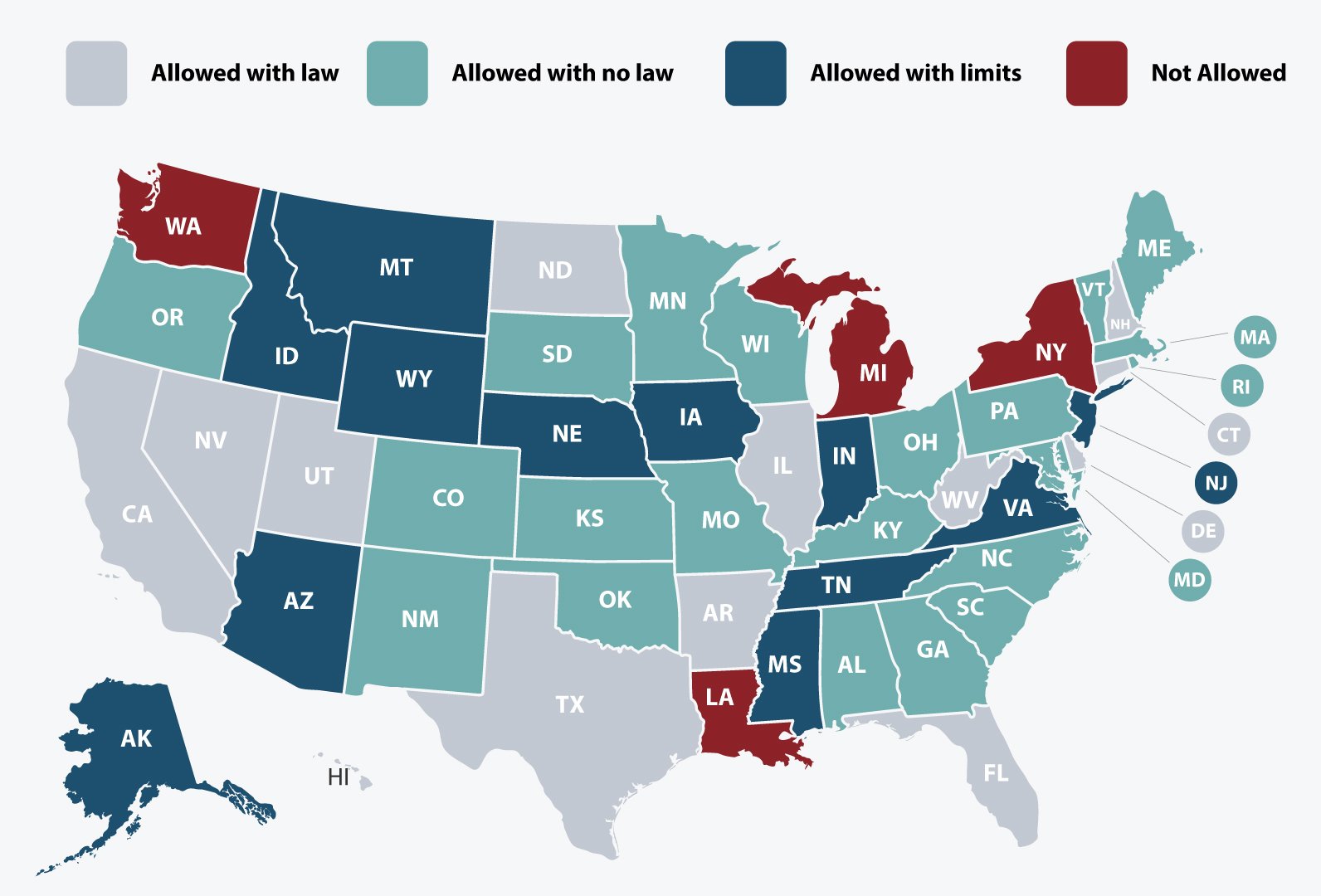Surrogacy Agency Based in Northern California
We connect surrogate mothers with intended parents in Roseville, Sacramento, the San Francisco Bay Area, the Los Angeles area, and beyond
What are the Surrogate Requirements and Qualifications? What Does the Screening Process Look Like?
At Made in the USA Surrogacy, we work with women who are healthy, dependable, and ready to make a life-changing impact. Before starting your surrogacy journey, every candidate goes through a simple screening process to make sure surrogacy is a safe and successful experience for everyone involved. As one of the most trusted surrogacy services in the nation, we collaborate closely with egg donors, IVF clinics, and industry professionals to provide a seamless process.
To qualify as a surrogate, you’ll need to meet the following surrogate requirements:
1 | Must be a US Citizen
All surrogates must be U.S. citizens living in a surrogacy-friendly state. Due to legal limitations, we cannot work with applicants living in certain areas where gestational surrogacy laws are restrictive.
2 | Be Between the Ages of 21-38
A surrogate mother or gestational carrier must be between the legal ages of 21-38. Some agencies will accept candidates who are older; however, at Made in the USA Surrogacy, we cap our age limit to 38 due to intended parent preferences.
3 | Successful Prior Pregnancy
You must have carried at least one full-term pregnancy without serious complications.
More than two c-sections, gestational diabetes requiring medication, preeclampsia, and other high-risk pregnancy conditions may disqualify you, but we’ll review each case individually.
A pregnancy history with the following complications may result in a disqualification:
- More than 2 c-sections
- Hypertension
- Medication controlled Gestational Diabetes
- Pre-eclampsia
- Severe cholestasis
- Multiple miscarriages
- Pre-term deliveries
A thorough review of your pregnancy and delivery history will determine if you meet the surrogate requirements.
4 | Psychological Requirements
All surrogates complete a psychological screening with a mental health professional to ensure emotional stability.
Disqualifiers may include current use of psychotropic medications, untreated mental health conditions, substance abuse, ongoing legal issues, or unstable living situations. A strong support system is key, as is your ability to work with your OB-GYN (obstetrician-gynecologist) and our team of industry professionals.
Possible disqualifications will include:
- Current use of psychotropic medications
- Mental health conditions such as bi-polar, schizophrenia, and depression
- Concerns involving litigation
- Concerns involving drug or alcohol abuse
- Abusive home environments
- Active divorce proceedings
- High-stress lifestyles
5 | Maintain a Healthy BMI (Body Mass Index)
All surrogate candidates must be within a healthy BMI range, which is between 18-30. A normal weight helps reduce the risk of gestational diabetes and hypertension. We encourage all applications who are outside of the BMI requirement to work on establishing a goal weight to achieve a healthy, normal BMI for a better surrogate pregnancy. Many surrogate applicants go on to a successful journey after a healthy weight has been obtained.
You can check your BMI using this calculator
6 | Non-smoker and No Exposure to Second-Hand Smoke
Surrogates must be non-smokers and should not be exposed to second-hand smoke, including vaping and medical marijuana. A smoke-free environment is essential for the health of the baby. All surrogate applicants are required to complete a urine drug test. Any substances detected, including medical marijuana, will result in a denial. All drug tests also check for the use of nicotine. Candidates who smoke or vape will be denied.
7 | No Criminal Record
Applicants must have a clean criminal record. This surrogate qualification is in place to safeguard all parties involved in the surrogacy process. Made in the USA Surrogacy will complete a criminal background check on all surrogate applicants and any adults who reside in the home with her. All adults must consent to a criminal background check. Please be sure to discuss this step if you reside with any other adults.
8 | Financially Sound
Financial stability is an important qualification to ensure that the surrogate is independent and not entering into the process out of financial necessity. Applicants who are receiving governmental financial assistance will not be accepted. WIC, food stamps, cash aid, section-8, and unemployment are examples of government assistance not accepted.
9 | Reside in a Surrogate-Friendly State
You must live in a state that supports and permits surrogacy arrangements. Some states have legal restrictions against surrogacy, so this is a key requirement. (Refer to the map below for additional information.) It is imperative the surrogate maintains residency in her state throughout the duration of the surrogacy process and delivery, due to each state’s specific surrogacy laws.
Surrogate-Friendly States:

Understanding Surrogacy Laws by State
Each state in the United States has its own laws, regulations, and requirements regarding gestational surrogacy, making it essential to understand the specific rules for the state you live in. While some states are surrogacy-friendly and have clear legal frameworks allowing surrogacy arrangements, others may impose restrictions or have no explicit laws addressing surrogacy at all. Made in the USA Surrogacy currently does not accept candidates from the following states: Indiana, Louisiana, Michigan, Nebraska, and New York.
Knowing your state’s surrogacy laws is critical to ensuring a smooth and legally sound surrogacy experience. This includes understanding contract enforceability, parental rights, compensation guidelines, and other legal considerations that may vary by jurisdiction. Consulting with legal experts or agencies familiar with your state’s policies is highly recommended. At Made in the USA Surrogacy, we help you navigate these complexities and ensure that all legal requirements are met, providing peace of mind throughout your surrogacy journey.
Looking to Become a Surrogate?
If you’ve had a healthy pregnancy and feel called to help others experience the joy of parenthood, you may be a great candidate for surrogacy. Becoming a surrogate is a powerful way to make a lasting difference in someone’s life, and we’re here to support you through every step. From excellent compensation to unmatched care and guidance, we make the process safe, clear, and rewarding.
Learn more with our become a surrogate page and talk to a surrogacy specialist today!
Frequently Asked Surrogate Requirements Questions
What disqualifies you from becoming a surrogate?
There are several factors that can disqualify someone from becoming a surrogate. These include having certain medical conditions, such as uncontrolled diabetes, heart disease, or a history of complicated pregnancies, which may pose risks to both the surrogate and the baby. Additionally, surrogates must meet specific lifestyle and health requirements, and issues such as smoking, drug use, or untreated mental health conditions can also lead to disqualification. Legal and logistical factors, such as living in a state with restrictive surrogacy laws or failing to pass a comprehensive background check, may further prevent someone from qualifying as a surrogate.
How many times can I become a surrogate?
According to the ASRM, it is ideal that a surrogate candidate does not have more than 5 previous pregnancies, and 3 cesarean deliveries. Therefore, the number of times a surrogate candidate can be accepted will depend upon the number of pregnancies and deliveries she has had.
I’ve had multiple pregnancies, and only one had a complication. Am I disqualified?
We understand that not all pregnancies are the same. If you experienced a complication in one of your pregnancies, but it did not replicate in a subsequent pregnancy you may still qualify. Please consult with us if you’ve experienced any complications, but went on to have a healthy, normal pregnancy thereafter.
I had an abnormal pap smear, can I still become a surrogate?
If you recently had an abnormal pap smear, please consult with your OBGYN about a possible colposcopy. Depending on your results you may need to wait until you have achieved normal results. Some doctors will recommend repeating your pap smear in 1 year.
I’m currently going through a divorce, can I still become a surrogate?
Surrogate candidates who are actively going through a divorce will need to wait until their divorce is finalized before becoming a surrogate.
Conclusion

